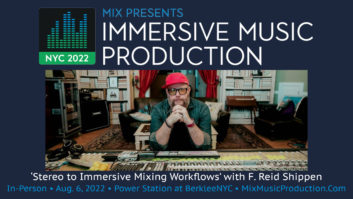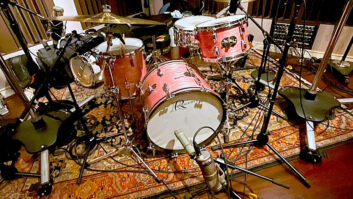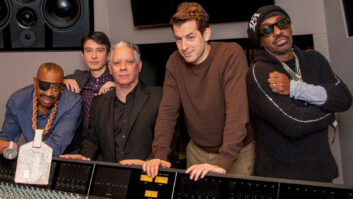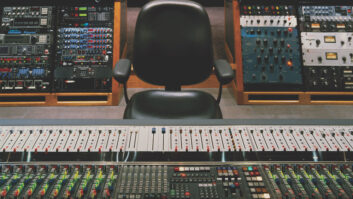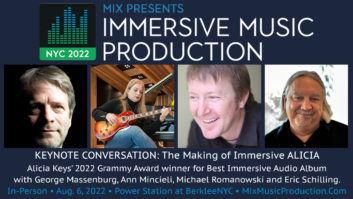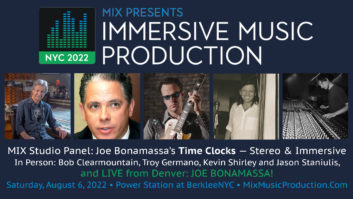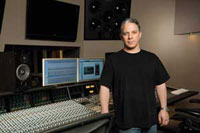
It’s been a long time coming. Five years ago, the Hit Factory, arguably the world’s leading studio, shut its doors and gave way to condo development, initiating the city’s slide in the commercial studio business. Quad soon sold its Penthouse, Sound on Sound merged with Right Track, and not long after, Sony Studios closed. Rates were too low, leases too high and artists had options at home. Doom and gloom settled into the local market.
But now, some former Sony employees are opening rooms under Seven Seas Entertainment, Quad announced the revamping of two studios, and in June, Troy Germano, former Hit Factory New York CEO — who’d been operating in and out of Europe since 2003 — opened the new two-room, high-end Germano Studios in NoHo, pictured on this month’s cover. Last month, Mix‘s New York editor, David Weiss, covered the opening in his “New York Metro”; this month, we ask Germano about the business.
After five years, what led you back to New York?
I had a lot of time to think and prepare, to build the kind of facility that might replace Hit Factory in today’s world. The concept was to work inside and outside the box, with a depth of gear available to clients — high-end outboard gear, a sizable Pro Tools system, a huge selection of plug-ins and choices in monitoring. One of the main reasons I went with the SSL Duality is the simple reason that it interfaces so sweetly with Pro Tools.
You committed to two Duality systems pretty early.
The only other choice I could have made was the [Digidesign] ICON D-Control ES. It’s a great tactile worksurface, and if I’m in a position to build another room in the future, I’ll look very seriously at it. But I think Alicia Keys [who bought a Duality] and her engineer, Ann Mincieli, saw something that nobody else here saw — how the Duality interfaces in a way that the J or K Series cannot. The path is shorter, the console is punchier and I don’t need the 80-plus channels we were used to. I didn’t want to be completely digital — it made sense to do something different. Not to sound cliché, but I really did want the best of both worlds.
So far, what’s been the reaction in the community?
Well, the studio has officially only been open about six weeks. We’ve had Alicia Keys in, Matisyahu, Mary J. Blige, Jennifer Hudson, Bruce Springsteen, LeAnn Rimes. The engineers like it, and so do the clients. Once they negotiate a rate with me, there are no other charges. It’s not going to be inexpensive. I want it to be the best studio in the country, and I’ve equipped it that way.
Is it risky to maintain that high end?
Doing something on a mediocre level makes no sense. There are enough ways to massage the numbers that you can reach about any type of client. A lot of people spent a lot of money with me at the Hit Factory, and I don’t forget about that. I hope new studios open because of what I’m doing. But it seems like my competitors on the West Coast are more my friends than my competitors here in New York, with the exception of Steve Rosenthal at the Magic Shop. The Rick Stevens, the Rose Manns, the Jeff Greenbergs — they get up in the morning and are happy to go to the studio. They’re happy to be in the recording business. They’re looking for ways to expand and do things differently and have a niche.
With the closings and all, New York’s had a lot of negative press. How can the community be revitalized?
Quite honestly, it would take people following my lead. Studio owners need to step forward, take a chance, power-pack their rooms and reinvest in the future. If you have a console you spent $600-grand on a few years ago and it’s now worth $50k, you have to suck it up, sell the console for $50-grand and put it into your Pro Tools system, your outboard gear or a new console.
Artists don’t want to go to studios with filthy bathrooms, dirty couches, ripped carpets and control rooms that smell. There are a lot of studios in this town. There’s a reason they’re not busy and there’s a reason they’re now fighting over pennies. Why would anybody want to pay a rate for something that’s not been kept up? I’m being very honest here. You have to give people a choice in how they want to make their record. Recording needs to be a special experience. You have to offer a bit more.
Tom Kenny is the editorial director of Mix, EM and Remix.
